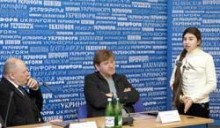A year ago the website of Ukraine’s Ministry of Education and Science posted call for an all-Ukrainian historical and literary contest entitled “My Fatherland through the Eyes of Children from All Ethnic Groups of Ukraine.” Since then the organizing committee has received over 2,000 prosaic and poetical works, as well as 900 drawings, photographs, and pieces of embroidery from school students representing grades 5 through 11 and all the regions of Ukraine. The jury faced a difficult task of choosing the very best out of the nearly 3,000 contestants. Last Friday the contest organizers announced 24 winners who were awarded certificates of honor. The rest were given certificates of participation. But the children are most of all pleased with the fact that a book with their works is going to be published shortly and the Museum of Books and Printing has recently hosted an exhibit of their contribution to the fine arts.
Winners were selected in the four nominations: “Literature,” “Historical and Cultural Dialogue,” “Mother Tongue,” and “History of the Development of Spiritual Life in Ukraine.” According to the organizing committee chairperson Olena Oganasian, the children devoted quite a few works to the Ukrainian language and the languages of ethnic minorities. Incidentally, participating in the competition were not only children who belong to ethnoses of the former Soviet Union (Armenians, Georgians, Azerbaijanis, etc.): there also are four works from Hungarians and even a contribution from a Uruguay-born boy now residing in Makiivka.
Almost half of the works came from children who had already had creative experience and were attending literary societies. There were also some anonymous handwritten works and others that comprised more than 10 pages. Under the competition rules, the jury did not study them, but Oganesian is sure that this shows the children’s wish to express themselves and to be heard.
“I like the Ukrainian language very much, although Gagauz is my mother tongue,” says Agnia Musafir, a contest winner and a 6th-grader of the Stary Troyan school in Odesa oblast. “I could not fail to write an essay for the competition because my mom teaches the Gagauz language in school, and this subject is very close to my heart and, besides, it is very topical in the world, for quite a few languages are on the verge of extinction.”
“By holding the competition, we got an opportunity to hear children through their words,” says Mykola Zhulynsky, head of the jury and director of the Institute of Literature. “To love language and the word is not just a moral duty of everyone — it is service to higher ideals. What stunned me in the competing works is the emotional charge, excitement, the ability to see the world in its diversity, and the feeling of being part of Ukrainian civilization. It is gratifying that the authors of the works care, in an ethnic way, about the destiny of their families and homelands. This means these children possess the gift of figurative thinking, which will help them realize themselves artistically.”
A similar contest will be held this year, too. Maria Richka, a winner from Zaporizhia, believes that every human has deep-seated artistic skills, but he or she just has no time to develop them.







